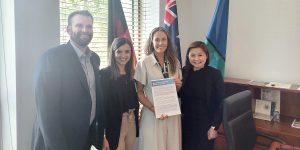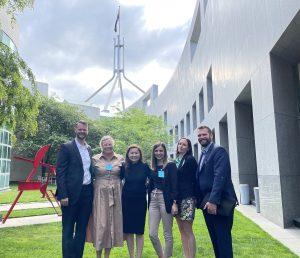1:30min

South Australian optometrist Jacqueline Warren is spearheading exciting new waves in collaborative eye care.
In 2019, Jacqui ran Australia’s first optometrist-led clinic at a public hospital ophthalmology department in Modbury, South Australia, as part of a pilot program. The aim of the pilot was to examine how optometrists could be effectively integrated into hospital services to reduce patient waiting times.
Jacqui is now working on designing a new sustainable and scalable collaborative model of care that will be rolled out in South Australia in the coming months. The model of care, she explains, is designed to bridge the gap between community-based eye care and hospital-based services, consequently reducing the burden on the public health system.
Jacqui’s optometry journey
‘I spent the early years of my career working in corporate optometry in South Australia,’ Jacqui said.
‘I reflect fondly on this part of my career due to the solid foundation it provided me for my clinical optometry training. I was also able to develop partnerships with allied health, and primary and tertiary healthcare professionals that I still utilise today. I’m passionate about establishing effective and collaborative relationships because optometry has a role to play in improving timely access to care, and reducing the social inequities that exist when accessing eye care.’
In 2016, Jacqui stepped into a part-time education role at Flinders University, which she said was a challenging experience at first.
‘It was a steep learning curve for me, but it helped me to stay current with the latest evidence-based research, and it gave me the flexibility to explore areas of optometry that I was passionate about.
‘I was then lucky enough in 2019 to work as an optometrist in the ophthalmology department at Modbury Hospital. I stepped away from corporate optometry at this point, and had my eyes opened to a world of pathology that I didn’t anticipate seeing in a metro setting in Australia.’
Running the first optometrist-led clinic in Modbury Hospital
‘The aim of the pilot program was to show that optometry services could be successfully integrated into public hospitals to reduce patient waiting lists and enable effective utilisation of hospital resources,’ Jacqui explains.
While working in Modbury Hospital, she observed that there were many patients with vision impairments that could have been prevented if they had received timely access to eye care services.
‘The public health system is bursting at the seams, with the demand for services clearly outstripping the resources available.
‘I learnt a lot of valuable lessons from running this pilot – the biggest being that the hospital-based system is clogged with patients that need to be reviewed, but don’t actively need hospital-based treatment.
‘These patients prevented the ophthalmologist from seeing new patients from the waitlist, and from providing adequate surgical services to meet the demand. The management and review of these patients clearly sits within the scope of practice of optometry, and seems the best place for optometry to make an impact.’
Designing a new and sustainable collaborative model of care
Once the pilot program concluded in 2020, Jacqui continued to work with SA Health and other key industry stakeholders to develop and build a new collaborative model of care for optometry to further assist ophthalmology departments.
‘I am in the process of finalising a new collaborative model of care to commence in South Australia in the coming months,’ she said.
‘When developing this model, I took the lessons I learnt from the pilot in Modbury Hospital, and other collaborative care models in Australia and overseas, to create a model that will be economically sustainable and scalable to any health network in Australia.
‘My big picture idea for collaborative eye care is for optometrists to be working to their full scope of practice, in ocular health focussed roles, whilst maintaining clinical autonomy to service the public health sector most efficiently.’
Overcoming challenges
Jacqui said that her main challenges in this space involve getting stakeholders on board and grappling with feelings of imposter syndrome.

‘I found that while everyone agrees that innovation is the only way forward, very few people are willing to take the perceived risk to make it a reality. My current project has been successful because I managed to secure industry support and ophthalmology support at the same, partly due to the work and advocacy support from Optometry Victoria South Australia and Optometry Australia.
‘I am hopeful that the research and data output that we will embed into this project will provide a solid foundation to argue for more funding for collaborative care models and reduce barriers in the future.
‘My focus for this project has always been to improve patient outcomes and timely access to care, and I try to focus on that and not any perceived or realised pressures that come along with it. I get imposter syndrome, an issue I have found to be endemic amongst optometrists, and certainly have had moments where I felt the scale of the project.
‘But this is such an exciting step for optometry that it is worth the time and the uncertainty, and with every pilot and attempt at collaborative care, we learn and gather more data that is ultimately of benefit to the outcomes of the community and eye care sector.’
Having a good support network is key
‘I am very lucky to have an extremely supportive leadership team at Flinders University who can see what I am trying to achieve, and who allow for me to allocate some of my university hours to developing my ideas. Not only do the patients benefit from this project, but students and the industry will benefit from increased career opportunities, and improvement in the calibre of graduating optometrists,’ Jacqui said.
‘Programs like this require working with external industry stakeholders and sometimes I do struggle with the expectations and flexibility needed to attend a meeting with minimal notice.
‘I have two kids under the age of five, and whilst I don’t get the work-life balance right all the time, I have learnt to be kind to myself and reflect on what I have achieved and not focus on the days when the balance is harder. As parents and leaders in the workplace, having a good support network is crucial to getting this balance correct.
‘I encourage all women to reach out for support when needed and provide it when you can in return. Advocating for optimum workplace conditions can not only help you achieve a work-life balance but also sets the precedent for the future.’
Do you know someone who is pushing boundaries or challenging the norm?
This year, the theme of International Women’s Day is ‘Cracking the Code: Innovation for a gender-equal future’. In line with this theme, Optometry Australia is recognising leaders and changemakers within our sector who are ‘Cracking the Code’ and using innovative approaches to shape new social, economic and cultural codes.
Like Jacqui Warren, if you know someone in our sector who is challenging the norm, and embracing new ideas, technologies or innovations, we ask you to help us celebrate them by nominating them to share their story and journey. Simply send an email to community@optometry.org.au, and let us know how they are ‘Cracking the Code’.

Tagged as: Advocacy & government, IWD, Scope of practice